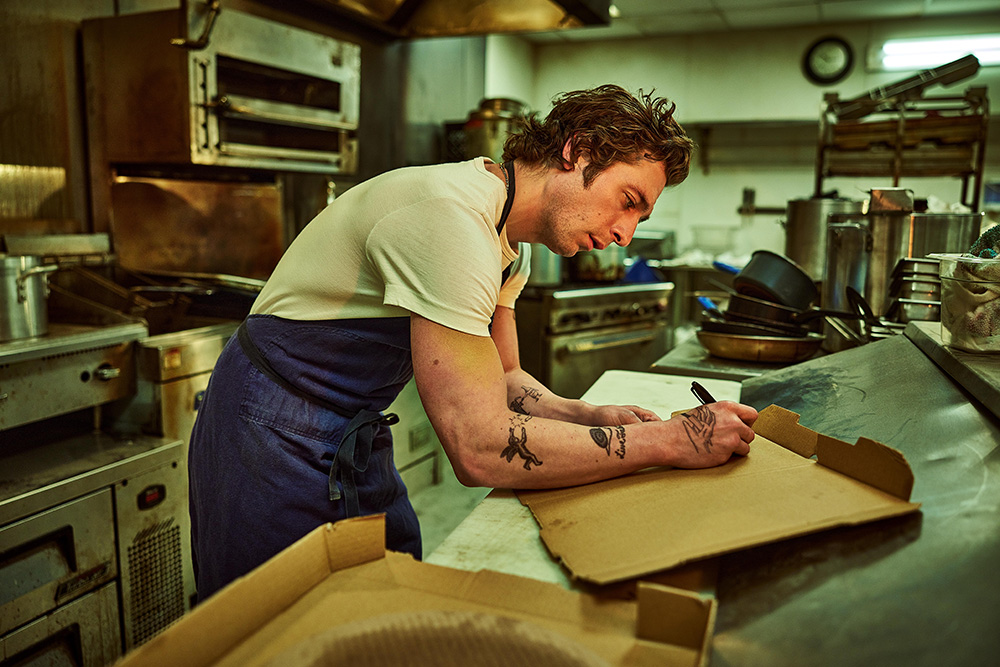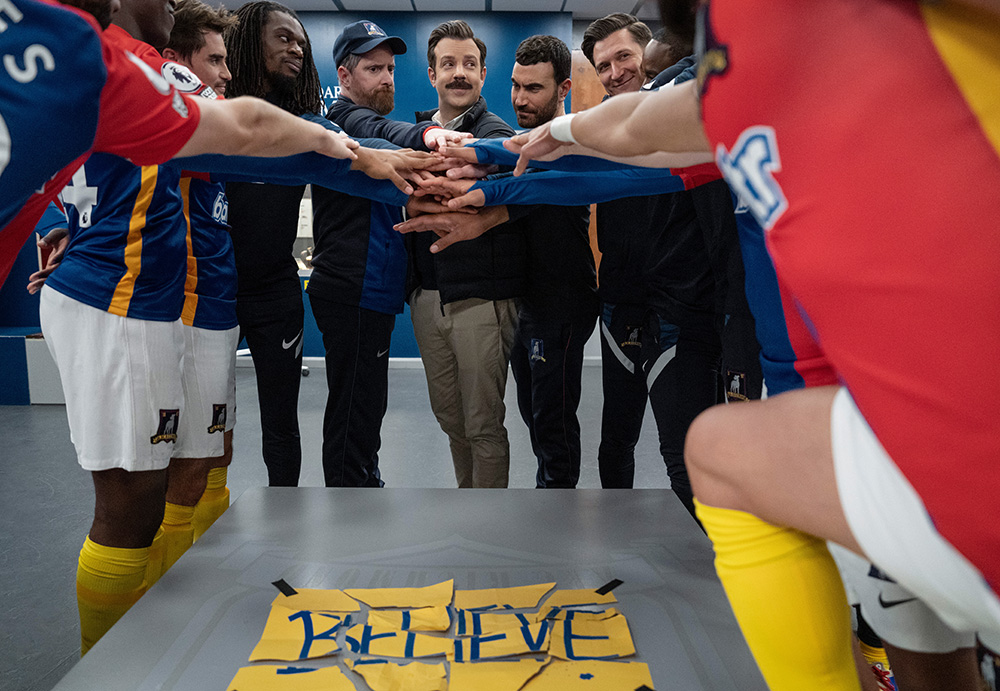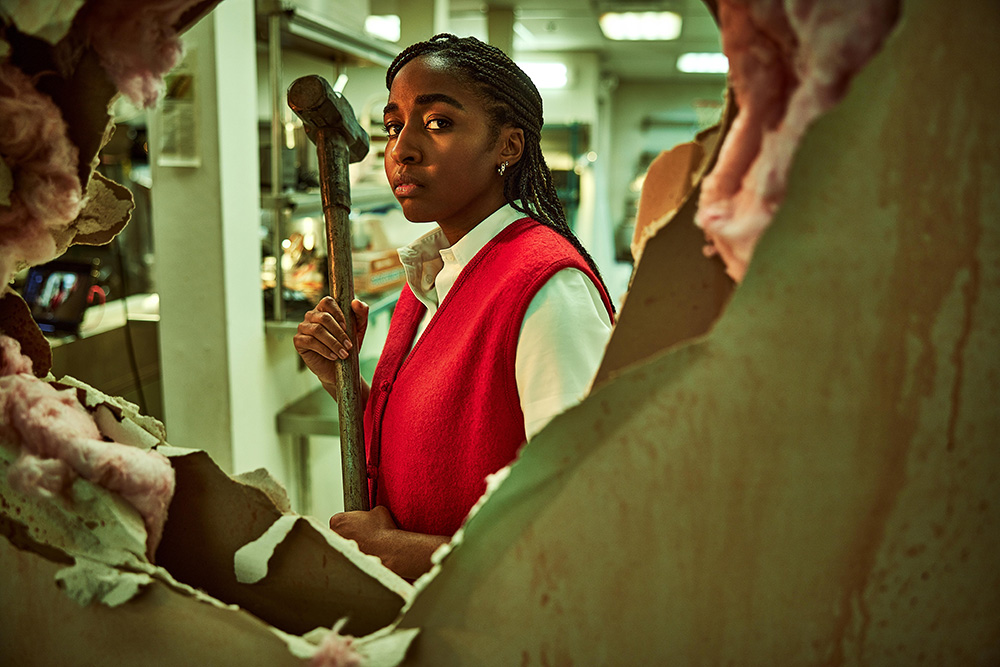
Jeremy Allen White in Season 2 of "The Bear" (Courtesy of Hulu)
For many people, especially in the wake of the "Barbenheimer" phenomenon, this has been the summer of returning to movie theaters. That this has also been one of the hottest summers on record, seeking refuge in a cool and dark movie theater makes additional sense.
For me, this has also been a summer of catching up on television shows, which has elicited some complex feelings, as I want to support the writers and actors currently on strike for fairer profit-sharing in the age of streaming platforms.
This current strike has already become the second-longest in industry history, reaching 100 days this week. Earlier this summer, Tim O'Donnell, a screenwriter and lifelong Catholic, wrote a compelling piece in NCR arguing that Catholics should care about the strike and the conditions that led the Writers Guild of America (WGA) to take such serious action.
I want to say clearly that I support the WGA and the Screen Actors Guild-American Federation of Television and Radio Artists (SAG-AFTRA) strikes. While the landscape of television and movie entertainment has been and continues to shift drastically, that is no excuse for unfair labor practices.
This week's column is inspired in part by the ongoing struggle for justice on the part of writers and actors, and my hope that a fair resolution can be reached so these talented folks can return to work and continue to produce the art that we enjoy. It is also inspired by the occasional segment that my "The Francis Effect Podcast" co-hosts (David Dault and Heidi Schlumpf) and I produce each season when we discuss what we have been reading, watching and listening to lately.
Advertisement
After a busy academic year and a hectic theology conference season in June, I was finally able to take a break in July to visit family and enjoy a little vacation and renewal. One of the things I most appreciated during this time was catching up on shows I have been looking forward to watching, but had not yet had the time or mental bandwidth to take in.
While visiting my parents, I watched the final season of Apple TV's "Ted Lasso" with them. Regular NCR readers may recall that I wrote about this creative, heartwarming and enjoyable show two years ago just before everyone else seemed to realize what a delight it was. At the time, after the first season's release, I argued that "Ted Lasso" exhibited a kind of "anonymous Christianity" (a phrase borrowed from the late theologian Jesuit Fr. Karl Rahner).
More recently, Karen Eifler argued in these pages why religion needs "Ted Lasso."
Appreciation for the show has made virtually any positive endorsement of "Ted Lasso" feel clichéd. It's true that while there are dozens of excellent programs available today, many via streaming services, few are as wholesome, uplifting and inclusive as "Ted Lasso."
Not long ago, I received a message from a reader who, apparently after I had positively reviewed the show, decided to watch the program but objected to the frequent use of curse words by some of the characters and felt that it was unbecoming of a Catholic priest and theologian to "promote" such a show.

A scene from the series finale of "Ted Lasso" (Courtesy of Apple TV+)
To such critics, who are admittedly quite rare, I say: De gustibus non disputandum est ("In matters of taste/opinion, there is no dispute"). You don't have to like the delivery or style of the program but, from what I can gather, the writers were simply trying to reflect the accurate parlance of British footballers, whose language is not nearly as puritanical as the standards of many American churchgoers.
I mention this unsolicited criticism of "Ted Lasso" because it suggests that some adults remain socially immature, and many are apparently incapable of experiencing and appreciating art through diverse media and on a variety of levels. It is a similar line of thinking and small-mindedness that led some parents in Florida to object to a sixth-grade art class that featured the sculptor Michelangelo's masterpiece "David."
In an age when there is an abundance of material to consume online, including things ranging from the truly detestable to the merely inane, creative and compelling art like "Ted Lasso" that reflects brilliant writing, acting, directing and producing is greatly needed.
This is especially true when the themes addressed in the show center on moral goodness, destigmatizing mental health issues, racial and ethnic discrimination, difficult relationships and teamwork.
Speaking of difficult but important themes, another show I watched recently was FX's "The Bear."

Ayo Edebiri in Season 2 of "The Bear" (Courtesy of Hulu)
Now, to be clear, cooking programs are typically not my cup of tea. I have a number of friends who watch "Top Chef" like it's March Madness and stream the "Great British Bake Off" like it's their job. But for as much as I enjoy eating good food, I don't generally get excited about food-centered or restaurant-industry television.
So it took some convincing by one of my friends to get me to watch "The Bear." The show, which recently completed its second season, currently has the enviable rating of 99% on Rotten Tomatoes. It is a hit among TV critics and ordinary viewers alike, and I have now joined its growing pack of fans.
While on the surface the show can correctly be described as about the restaurant industry in Chicago, it is about so much more. What I found most compelling are the dynamics — those both healthy and so much more that isn't — about family, friendship and work relationships to which most viewers can relate.
I hesitate to share much about the plot or character development because I don't want to spoil the experience of watching the chaos in the kitchen and chaos of life unfold before your own eyes, mind and heart.
Like "Ted Lasso," albeit in a very different style and often darker emotional setting, this show captured my attention and drew me into a narrative world that can feel very real. No character is one-dimensional, not even those in the seemingly smaller roles. Each develops over time, and you come to love and hate and love again both the blood family at the center of the saga and the chosen family at the center of the kitchen.
"The Bear" is the kind of show that challenges viewers to reflect on the meaning of love and loss, loyalty and respect, friendship and family.

Rosario Dawson in "Star Wars: Ahsoka" (Courtesy of Disney+)
There remains one program on my summer list that has not yet been released: "Ahsoka." Coming to Disney+ later this month, "Ahsoka" is the latest installment of the recent brilliant spin-offs in the "Star Wars" universe. It tells the story of Ahsoka Tano (played by actor Rosario Dawson), a former Jedi Knight who, according to the official description, "investigates an emerging threat to a vulnerable galaxy" in the years after the fall of the galactic empire.
For "Star Wars" nerds like me, this show is a very exciting development, especially since it centers on a female lead.
As grateful as I am for the high-quality television programming available to us in this new golden age of the "small screen," every time I watch one of these new shows or take in a classic such as NBC's "The Office," as I did on a flight earlier this week, I am reminded that real people make these programs possible, and real people are fighting for justice in the workplace at this very moment.
All people of goodwill should be concerned about the state of pay equity in the entertainment industry, not just because the lack of it might threaten our collective ability to be entertained by high-caliber programming, but also because it is a moral issue about the dignity and value of working people.





